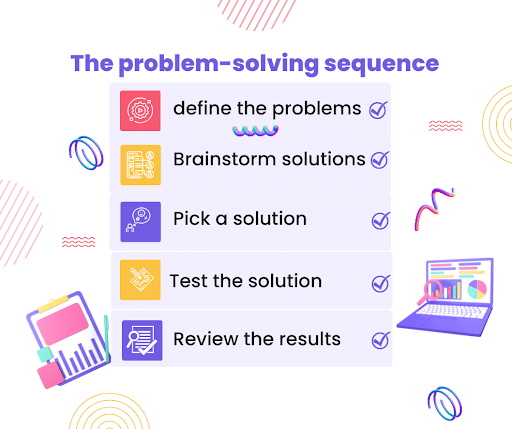How Important Is Problem-solving Skill?
How Important Is Problem-solving Skill?

In today’s world, children have access to vast information on the internet. While this knowledge can be helpful, it can also be overwhelming, making learning more challenging than ever before.
To navigate this sea of information, children must develop problem-solving skills. As they encounter problems in their daily lives, they must learn to choose and evaluate possible solutions. Developing problem-solving skills early on can help them form good habits and thinking patterns.
Importance of Problem-solving skills from a young age
Here are several reasons why problem-solving skills are crucial for your preschoolers:
1. Critical Thinking: Problem-solving encourages critical thinking, or the ability to analyze and evaluate information logically. This skill helps children make rational decisions throughout their lives. It’s great that you don’t always have to be there to solve their problems.
2. Academic Success: Problem-solving skill is highly related to academic success. Children who solve problems are better equipped to excel in math, science, and language arts.
3. Life Skills: Problem-solving is essential for everyday life, from resolving conflicts with others to making decisions about personal health and safety. You can rest assured that your child is equipped with the necessary independence for their life.
4. Innovation and Creativity: Problem-solving fosters creativity and innovation. Children can think outside the box with proper solutions and find ways to succeed.
5. Adaptability: In a rapidly changing world, adaptability is crucial. Problem-solving skill helps children become more adaptable and open to change, which is essential for success in a dynamic society.
6. Confidence: Successfully solving problems boosts a child’s self-confidence. They learn to trust their abilities and become more willing to tackle new challenges.
Six ways Parents can help to reinforce Problem-solving skills for Preschoolers
It is essential to note that preschoolers often face difficulties when it comes to solving basic problems. Whether it’s toy-related conflicts, challenging math equations, or negative peer pressure, it can be challenging for them to navigate these situations. As responsible parents, it’s crucial to gradually guide and teach them basic problem-solving skills to help them develop and succeed.
1. Learn to manage your child’s emotions:
Children aged 3 to 5 often struggle with managing their emotions. It’s vital for them to learn emotional regulation before tackling problem-solving.
Teach your child that all emotions are valid, including anger, frustration, happiness, and sadness. However, it’s crucial to respond to these emotions appropriately.
Encourage your child to identify and express their emotions. When they’re upset, ask them what they’re feeling and validate their feelings.
Help your child find a calming space where they can process their emotions and relax their body. This will help them learn and grow.
Once your child is calm, work on problem-solving skills by brainstorming solutions together. Listen to their ideas and take notes without commenting. This will allow your child to practice their problem-solving skills and feel more invested in implementing the solutions they come up with. Don’t worry about mistakes – they’re a valuable learning opportunity for your child.
2. Understanding the problem-solving sequence:
Parents must understand the problem-solving sequence to guide children to find solutions.
By applying this problem-solving diagram, parents can help children gradually get acquainted with problem-solving skills in all situations in life. You’ll be amazed by the unique solutions your child comes up with!

3. Use everyday moments
As parents, you can help your children develop problem-solving skills in their day-to-day interactions. Whether at home, in the grocery store, or going through your daily routines, like mealtime or bath time, there are plenty of opportunities to teach your children how to solve problems.
Kids will encounter problems everywhere they go. For instance, they may have to figure out how to share one toy truck among several kids or decide how to arrange their sleeping area in the classroom so that their classmates can nap. You can also encourage your child to suggest ways to distribute the food package for their pet fish.
While these situations may seem easy to adults, children need to use trial and error to arrive at the correct solutions. By providing them with opportunities to practice problem-solving skills, you can help your children become more confident and capable of handling challenges they may face in the future.
4. Ask Open Ended Questions
Children always have problems that need to be solved immediately by their parents. But if parents constantly answer their child’s questions, it will prevent them from brainstorming to find solutions next time.
Instead of answering all of your child’s questions, you should delay for a while by asking your child open-ended questions.
Encouraging open-ended questions can stimulate children’s problem-solving skills and foster critical thinking. Here are open-ended questions to provoke your children’s problem-solving thinking:
“Why do you think happened?”
“What do you think will happen if…”
“What might happen if we tried a different approach?”
“Can you come up with as many solutions as possible for this situation?”
“What are the pros and cons of each option you’ve thought of?”
“Why did you choose to…”
“What tools could you use to help solve this problem?”
“How would you explain this problem and your proposed solution to someone else?”
“What do you think caused the change?”
“How can we break this problem down into smaller parts?”
“What are some creative ways to approach this challenge?”
“How can we test your solution to see if it works?”
“What might happen if we don’t address this problem?”
“How can you involve others and collaborate to find a solution?”
“What potential challenges or obstacles might we encounter along the way, and how can we prepare for them?”
5. Model problem solving
Preschoolers often look to their parents as role models and learn by observing their behaviour.
It’s a great idea to involve your child in age-appropriate family decisions, such as planning outings, selecting meals, or budgeting for expenses. This will encourage your child to participate and share their ideas and thoughts on various issues, such as:
How to pack luggages in the most compact and complete way?
What meal should we prepare for the trip?
Which destination and what fun activities should we choose?
Afterwards, explain your final choices to your child for reference. This helps them make better decisions for their future work.

6. Read books and tell stories.
As a parent, you can share stories with your children by reading books together. These stories often present characters who face challenges and overcome them, providing valuable lessons for children on problem-solving in their own lives.
To reinforce the lessons in the book, discuss the story’s main problem with your child. Ask them to identify who solved the problem and why they chose that approach. By doing so, you are helping your child learn to analyze situations and develop strong problem-solving skills.
Conclusion
To foster problem-solving skills in children, parents, teachers, and caregivers can provide opportunities to tackle various challenges, ask open-ended questions, encourage creativity, and provide constructive feedback.
By consistently implementing these tips, parents can help their children become confident and effective problem solvers, which will benefit them throughout their lives.
Mulberry School Tour
Our Locations
Click here to visit our Contact Us page and view the preschool/infant care centres conveniently located near you.
CONNECT WITH US
USEFUL LINKS
About Us
Mulberry Learning prides itself on making the preschool experience both memorable and enjoyable while transforming a child into a competent explorer, an imaginative thinker, and a creative problem solver. Through our proprietary award-winning curriculum, unique Habits of Mind programme and dedicated staff who are passionate about imparting positive attitudes, Mulberry Learning holds strong in its promise to deliver a holistic education that nurtures the Future Ready Child.
A PREMIUM PRESCHOOL BRAND UNDER GLOBAL EDUHUB


